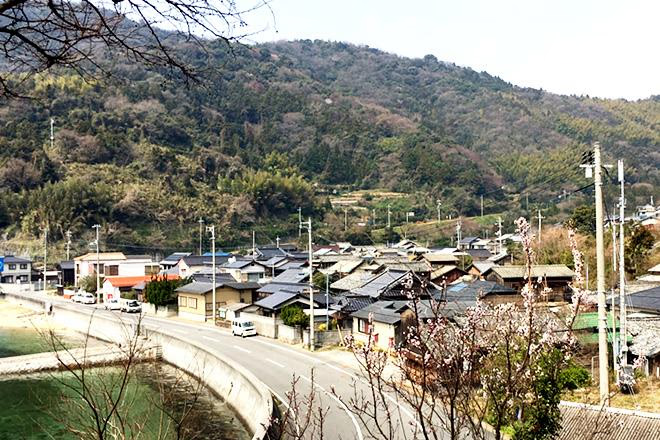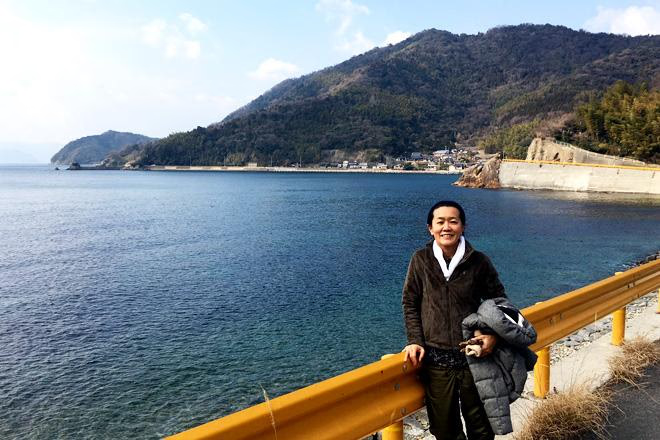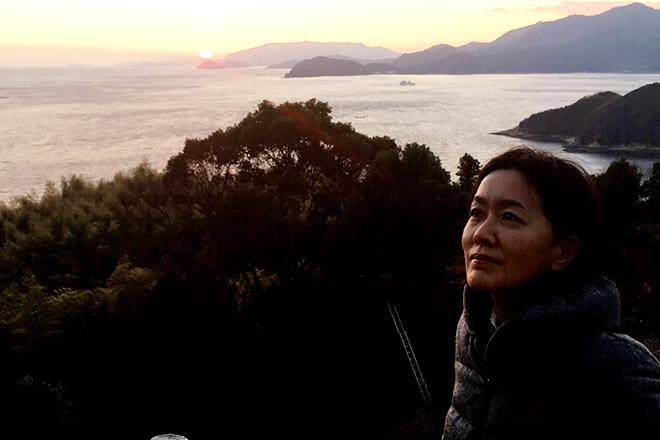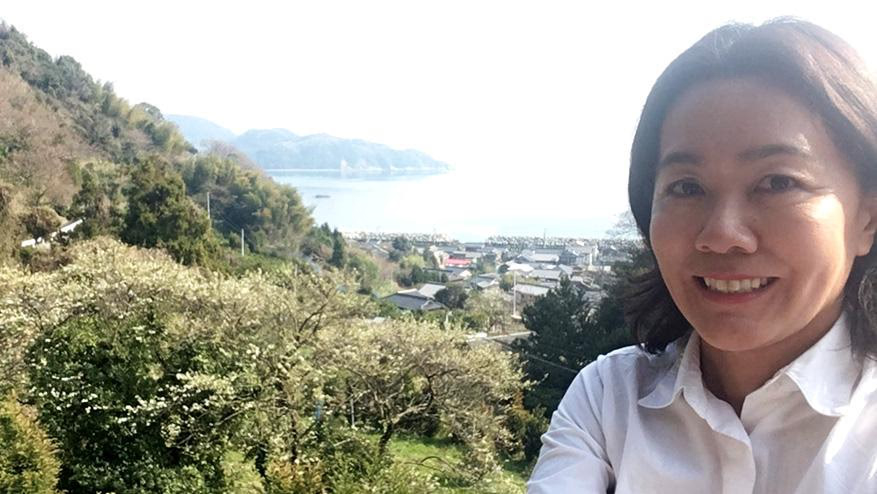I am Vice President Nagai.
Monosus has expanded its scope of activities to four locations, including Thailand, Osaka, Kamiyama-cho, Tokushima Prefecture, and Yoyogi, Tokyo. This was not done with the aim of expanding or increasing, but rather each location started with a different individual's "idea," and the current Monosus is the result of choosing what we thought was best at the time.
And now, we have a fifth idea and have decided to open our fifth base, the Suo-Oshima Satellite Office.
By the way, where is Suo-Oshima?
Suo-Oshima may be a place name that many people have never heard of before.
It is an island in the Seto Inland Sea, southeast of Yamaguchi Prefecture, close to Hiroshima Prefecture. Although it is an "island", it is connected to Honshu by a bridge about 1 km long, and you can travel to the island by car.
It is the third largest island in the Seto Inland Sea after Awaji Island and Shodo Island. On Google Maps, it is listed by its official name, "Yashiro Island." Locals call it "Oshima," or "Suo-Oshima" to distinguish it from the many other "Oshima" islands throughout Japan. As an aside, there are a whopping 75 "Oshima" islands in Japan, ranging from really large "Oshima" islands to small uninhabited "Oshima" islands.
Administratively, the main island of Suo-Oshima and several other outlying islands accessible by bridges and boats make up one town, Suo-Oshima Town, with a population of 17,199 (as of October 1, 2015). This is more than double the population of Izu Oshima, a famous "Oshima" in the Kanto region with a population of about 8,000. The word "island" may give the impression of an isolated land, but it is surprisingly the base of life for many people. It is also a popular day trip destination and beach destination for visitors from Hiroshima and Fukuoka, especially on weekends.
Then, in 2012, Iwakuni Airport, about an hour's drive from the island, opened, and the distance between the island and Tokyo was greatly reduced. It is now so convenient that you can leave your home on Suo-Oshima in the morning and head to Monosas in Yoyogi, Tokyo, arriving by 10:30 at the earliest.
The decision to open the Suo-Oshima satellite office
Please bear with me for a bit of an old story.
Why did you want to work on the web?
This is a question I was asked in a job interview when I first started working in the web industry.
I still remember the answer I gave back then.
"I want to keep working. Even if I have children, I think I can continue working in the web industry."
In the end, I never had the chance to have children for about 20 years, and I continued to work in the web industry as a director, manager, and occasionally in sales. While I was working in a job that was difficult to do only in Tokyo, specifically around Shibuya or Roppongi, the world was gradually preparing for an environment where I could work regardless of location.
The communication speed of the internet has gone from the days of "kbps" where even still images were displayed in a choppy manner to the point where 100Mbps lines can be installed even in the most remote corners of the countryside. Video phone systems have gone from being only available to large corporations and costing millions of yen to being available to anyone for free and always-on with Hangouts and Skype. Messenger and LINE have become tools that allow reliable communication with busy, talented people who have difficulty arranging phone calls or meeting times due to time differences.
I myself have come to truly appreciate the benefits of this environment as the company works in Kamiyama, Thailand, Osaka, and with partner companies in Dalian (China) and Hanoi (Vietnam).
At the same time, the number of people who desperately want a way to work that is not dependent on location is also increasing.
At Monosus, we are gradually seeing staff members working shorter hours or returning from childcare leave to balance work and family life. The web industry is no longer just for people in their 20s who can work as hard as they want, but is also seeing an increase in people in their 30s and 40s who are starting to raise children or are starting to think about the practical issue of caring for their parents.
In such a situation, it will obviously be difficult to commute to a workplace far from home.
In addition to family issues, more and more people are choosing to live differently on their own. For example, in the foreign culture of Thailand, some people are questioning what they take for granted, and in Kamiyama, where wisdom for living and human relationships are more important than in the city, some people are experiencing a lifestyle they never experienced in Tokyo.
I think that these are ways of life that I probably would never have had the opportunity to become aware of if I had continued working and living in Tokyo.

And I had some personal things going on as well.
A turning point in my spouse's life. How my mother will spend her retirement. What to do with the land, house, and grave of my parents' hometown, Suo-Oshima. And on the other hand, I remembered the thoughts I had when I changed jobs 20 years ago.
"I want to keep working. Even if I have a child, I think I can continue working in the web industry."
Now that I have spent the last 10 years transferring the skills I have cultivated to Monosus, I am wondering what contribution I will make to Monosus in the next 20 years, which is the same length of my working life as I have so far, until I reach retirement age.
The external environment has improved dramatically since then, and Monosus is a company that is exploring new ways of working. In the midst of all this, even though it wasn't the right time to have a child, I was thinking about how I could continue working and how to increase the value of my work, so after consulting with those around me, I was accepted and decided to move and open a satellite office.
The satellite office is planned to serve as a testing ground to see to what extent the disadvantages of being far from Tokyo can be minimized, and what benefits can be derived from having colleagues from the same company in a distant location and different environment.
How will you work in Suo-Oshima?
Although there was only one person working there at first, the company started out as a satellite office after Kamiyama.

The satellite office will be located in Jikamuro, a small village sandwiched between the sea and the mountains. At its peak, over 2,000 people lived here, but today, just under 70 people live there, less than the entire staff of Monosus. Even within Suo-Oshima, people are surprised when we tell them we've moved to Jikamuro, saying, "It's a depopulated area in the middle of a depopulated area."
For the time being, I plan to commute to Tokyo (Yoyogi) once or twice a month, for a total of about 4 to 7 days, and on the other days I will work at the Suo-Oshima satellite office.
No matter how convenient the communication environment becomes, I don't think there will ever be a time when "work is better done face-to-face." General meetings where all staff meet face-to-face, meetings to discuss the future direction of each business, and even lunches and drinking parties where coworkers share a fun time, even if it's unclear whether they can be called work, can't be replaced by video calls.
However, even among "meetings," reports and progress check meetings, where the main purpose is to communicate facts, can be held over a video conference without any problems, and I believe that "individual tasks and organizing one's own thoughts" can actually be done remotely, allowing one to concentrate and increase productivity or arrive at new ways of thinking that would not come up if one were all in the same environment.
Of course, all of this is still just armchair theory. If there are any obstacles or possibilities for improvement, we would like to continue to make changes as necessary and cooperate with Tokyo and other bases to explore ways of working that will become a new model.
The time we spend working is long and important in our lives.
And just as importantly, time outside of work is also important.
I would like to aim for a working style that allows me to value both, and that is recognized and respected by those around me.

